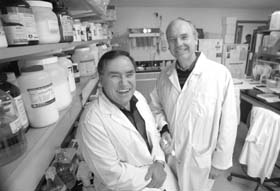
| ||
 | ||
 Parasitologists Gaetan Flaubert and Roger Prichard PHOTO: OWEN EGAN |
The basics of biotech
|
SYLVAIN COMEAU | Next semester, the Institute of Parasitology will introduce the Graduate Certificate in Biotechnology.
The four month, 15-credit program will be geared for students who already hold an undergraduate or graduate degree in the sciences, medical sciences or agriculture, as well as for budding biotech professionals seeking to expand their expertise. "There is a dramatic need for qualified people who can function well in the biotech industry," says institute director Professor Marilyn Scott. "At the moment, most of the people being hired either have an undergraduate or graduate degree in sciences. "Undergraduate training is largely theoretical, with little opportunity for hands-on work in the lab. As for people with graduate degrees, they have expertise on conducting research, but their technical skills are limited to what they needed for their thesis project. Students in other university programs are not exposed to how the biotechnology industry works." The program will be offered jointly by the Faculties of Agricultural and Environmental Sciences, Medicine and Science, but the institute spearheaded the initiative. "We are developing the program because we do a lot of research that touches on the work of biotechnology companies, especially pharmaceutical companies," says parasitology professor and program director Roger Prichard, McGill's newly appointed Canadian Pacific Professor of Biotechnology. "We also do work which can be of interest to agricultural biotech companies; parasites have an impact on the quality of food, and some biotech companies are trying to develop genetically engineered, pest resistant plants." The institute designed the program after consulting with local biotechnology companies. "We went to see them, and we asked: 'What would you like us to teach the students -- your future employees?'" recalls parasitology professor Gaetan Faubert. "'What are recent graduates lacking when you hire them?' We designed the program by filling those gaps." One of the biggest gaps is a lack of knowledge about how a biotech company is run. Since some graduates will end up in decision-making positions in the industry, Faubert has been appointed as coordinator of "Biotechnology Management," one of three required courses within the program. "This course covers different aspects of biotech, such as patenting and regulatory approval of new drugs; record keeping in the laboratory; quality control; and the business of running a biotech company. The idea is not to make students experts in any of these areas, but to give them a basic understanding of all of them." The eclectic course will be taught by a series of guest lecturers from the industry. "Biotechnology Lab Techniques," another required course developed by parasitology professors Greg Matlashewski and Paula Ribeiro, will teach the laboratory skills necessary for cutting edge biotech research - including methods of determining the expression of genes in cells, methods of replicating DNA in the lab, and the creation of transgenic animals (animals genetically engineered to contain the genes of more than one species). Students can choose either "Selected Topics in Biotechnology," taught by Prichard, or "Topics in Molecular Biology," taught by biology professor Howard Bussey, as their third required course. Among the electives offered (students select two) is "Bioinformatics"- an introduction to the science of using computers to compare the sequences of genes and proteins. This new course was developed by parasitology professor Robin Beech. Students can also venture outside the lab and classroom and do a practicum in a biotechnology company as an elective. The program will, of necessity, provide more of an introduction to the sector, rather than a last word, says Prichard. "I don't like the term crash course, but this program will be intensive; our method will be to highlight examples from different areas of this vast field. It will show how biotechnology is being used, what its potential is, how industry uses biotech breakthroughs to create new products and services, and issues of ethics and the public good." Scott notes that such a program is well placed in Montreal and Quebec, where 40% of Canadian biotech firms reside. "There are new biotech companies opening every day, and they face a shortage of qualified personnel. We're trying to provide these companies with individuals who are more appropriately trained, so that the company doesn't have to provide as much in-house training." Initial funding has come from McGill, the Faculty of Agricultural and Environmental Sciences and the Institute of Parasitology. Major expenses have been $50,000 for a major renovation of laboratories at Macdonald Campus and almost $200,000 for new equipment. "We also expect support from the biotech industry," says Prichard, "but their contribution, at least initially, will come in the form of time and effort." Industry professionals will act as guest lecturers in several courses, in addition to the biotechnology management course. Prichard feels that the program "will be of national interest." To that end, the institute has already established a web site describing the biotechnology program at http://biotechnology.mcgill.ca.
|
|
| |||||